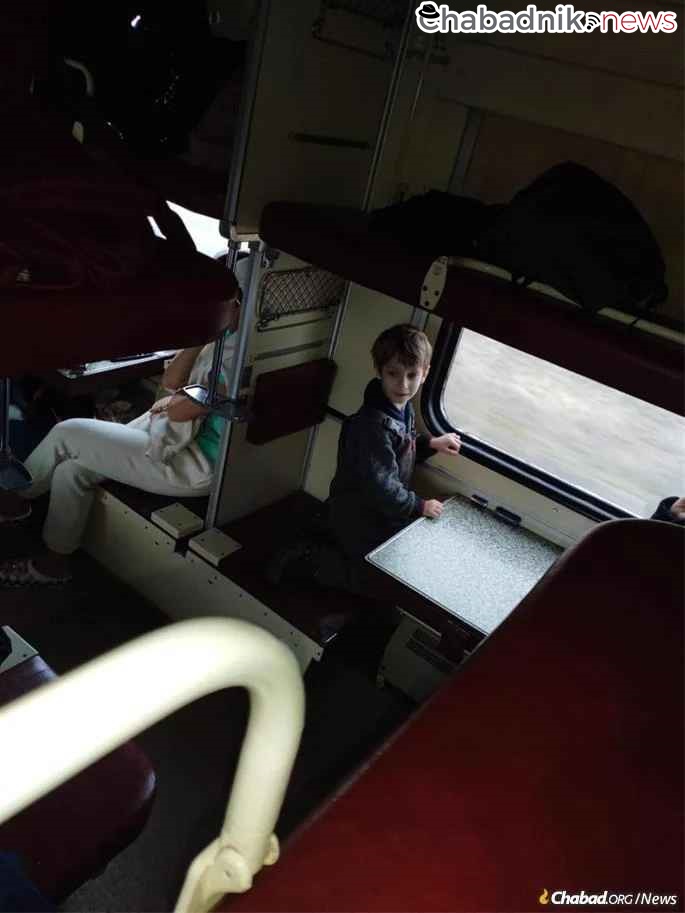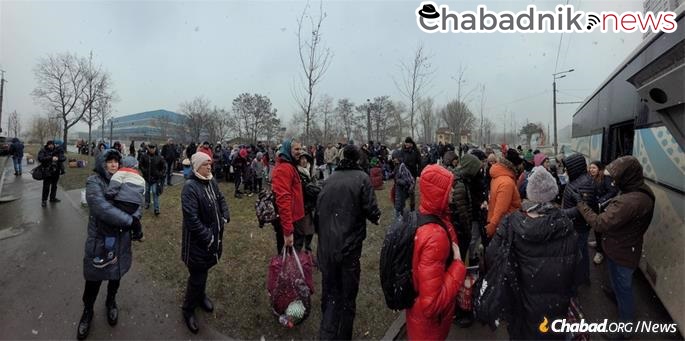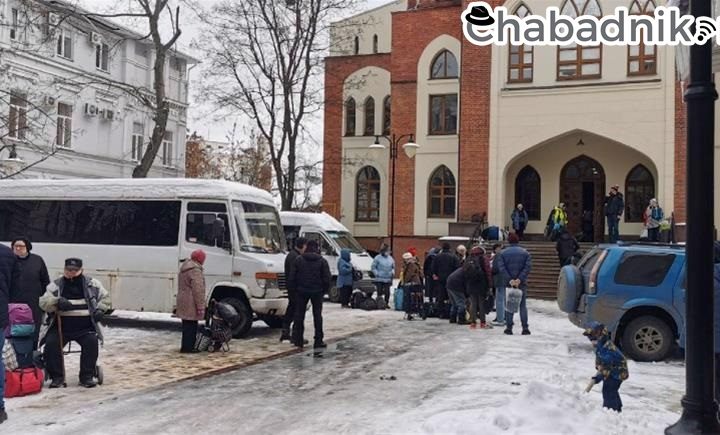Helped by Chabad at every step
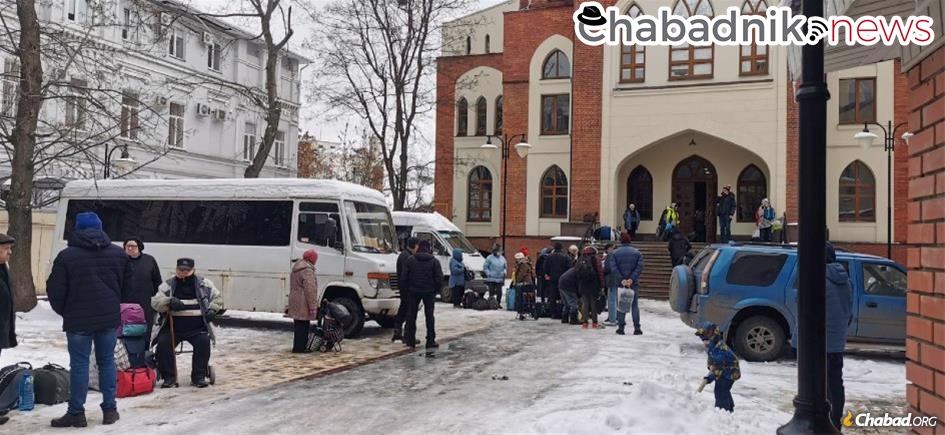
Alona Dedovsky considers herself lucky. For nine days she, her husband, young son, elderly parents and even older great-aunt lived deep underground in Kharkov’s Prospekt Gagarina subway station.
“We came there early and got space in the metro cars where it was warmer,” says Dedovsky. “Most people had to sleep on the stone platform.”
Until the early morning of Feb. 24, Alona and her family lived together in a comfortable apartment down the block from the subway. “We had hopes. We had plans. We just bought our apartment a few months ago,” she says from her hotel room in Hamburg, Germany. “We had dreams.”
Their hopes, plans, and dreams, like those of millions of other Ukrainians, were forever altered when Russia launched a war that the West had warned about, but few in the former Soviet Union believed would ever take place. Kharkov, an elegant university city just 20 miles from the border, was hit hard from the beginning. Artillery fire, bombing-raids, and within days, missile strikes.
From the first moment, Alona knew she didn’t want her four-and-a-half-year-old son, Danya, to hear any of the terrible new sounds echoing through her city. So on that first morning, instead of taking him, as she did every other morning, to Chabad-Lubavitch of Kharkov’s Ohr Avner Jewish preschool, she led him and the rest of the family down into the subway.

“I didn’t need Danya to hear the bombs and be afraid of glass being blown out of our windows and the fire burning up the sky,” Dedovsky says. “I wanted to shield him as much as I could.”
At first, it was like a game. They were going to sleep in the subway, an adventure of sorts. Then nighttime came and it got colder and they were still there and Danya just wanted to go back home, back to his warm bed. “But we survived that,” says Alona. “It was much better than what was going on above ground.”
As the hours and then days passed, and fighting intensified, the subway got fuller. People were sleeping everywhere. There was only cold running water. The bathroom got filthier and filthier. Still, there was humanitarian aid being delivered into the station: bread, yogurt for the children, warm clothes. “The metro workers helped as much as they could,” she adds. “They even gave out blankets to those who didn’t have them.”
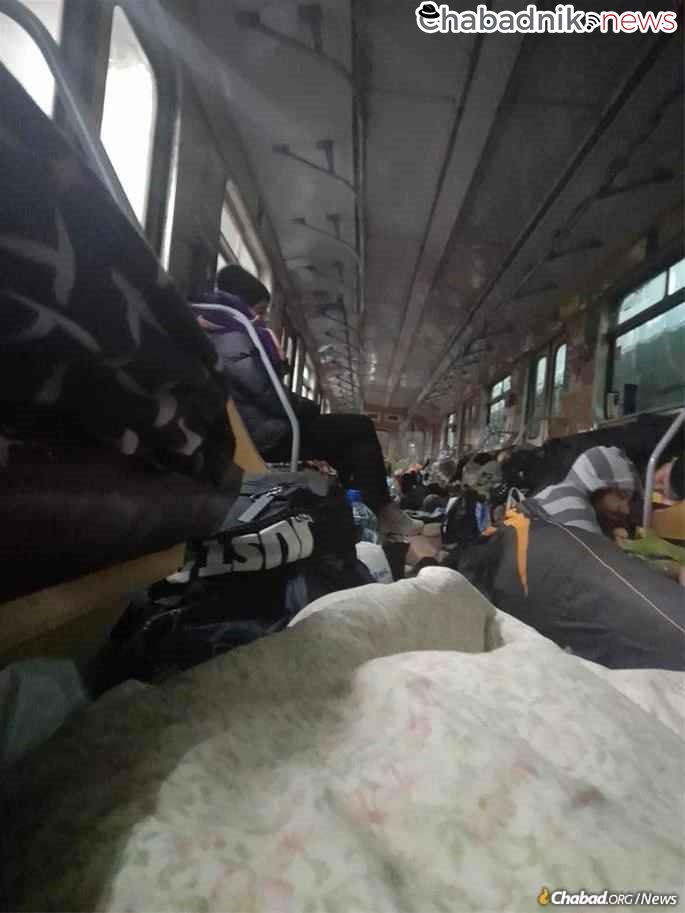
On March 4, Alona connected with Esther Raices, a Chabad emissary in Kharkov who directs Danya’s Jewish preschool. Raices told the young mother that the Chabad Jewish community was sending buses out of the city every day, and she should head to the Choral Synagogue for a ticket out of the decimated city.
On Shabbat morning, March 5, Dedovsky and her family emerged from the subway. Aside from her husband, who had made quick runs out of their subterranean shelter to pick up necessities from their home or food and juice from nearby stores—while they still had something to sell—none of them had been outside in nine days. What Alona saw when she came out into the light of day was a city she couldn’t recognize.
“I was in shock,” she says. “Kharkov was a beautiful city; it’s destroyed. I can’t imagine what it will take to restore it. It was awful to look at.”
The family, six people altogether, headed to the synagogue where they secured places on the next bus leaving the city. While travel on Shabbat is forbidden according to Jewish law, it is not only permissible, but mandated, when a person’s life is in danger.
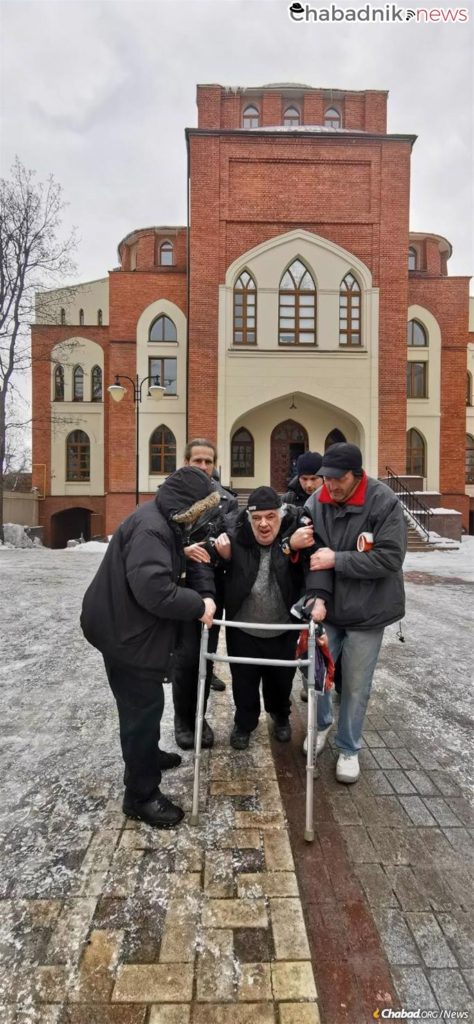
Kharkov’s synagogue, led by Rabbi Moshe and Miriam Moskovitz, has served as a center of aid since day one of the war. Chabad’s kitchen pumps out food for the 100 or so people living in the building, volunteers deliver food to the homebound, and it’s the central location from which the Jewish community continues to be evacuated from the city.
It also sits in the city center. If during the day Kharkov’s outlying suburbs are shelled without reprieve, every night Russian airplanes fly over the city center dropping bombs. Just the other night, the modern Nikolsky shopping center next door to the synagogue was bombed to smithereens, the force of the explosion blowing out a number of the Choral Synagogue’s massive windows, sending shattered glass into the sanctuary below.
On the morning the Dedovskys escaped on the Jewish community buses, there was so much debris on the streets that the buses couldn’t pull up all the way to the synagogue gates.
“That was the first moment Danya got scared,” says Alona. “We had to walk a few minutes to the buses, and we passed these destroyed buildings, bricks falling off the facades, littering the street, cars swerving around the mess and splashing us with mud.”
That’s when the frightened little boy turned to his mother and cried out: “Mama, what’s happening?!?”
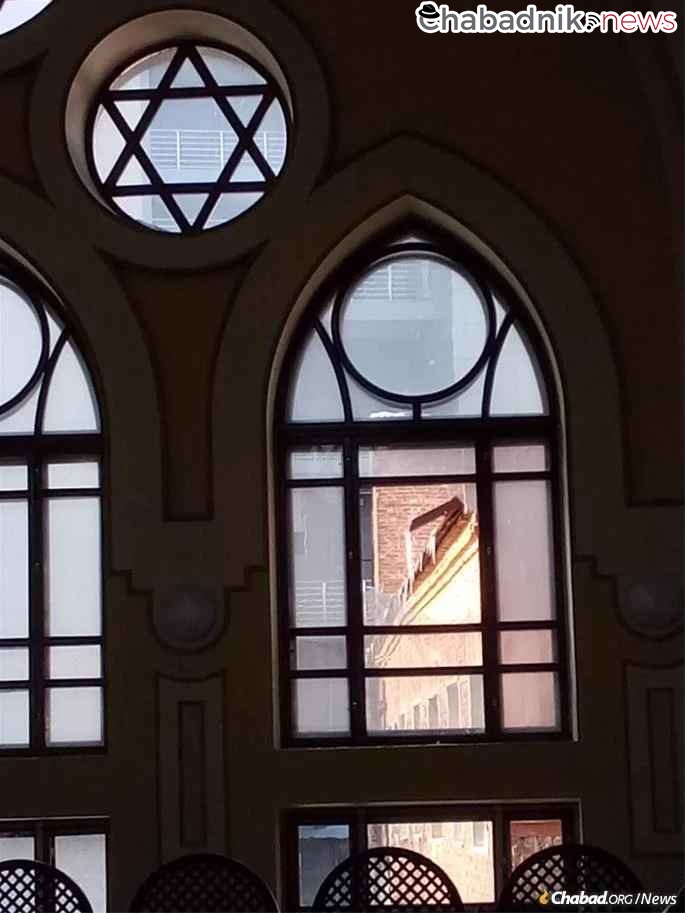
Branches of the Menorah
While the refugee traffic throughout Ukraine has become notorious, not to speak of the terror of being fired at along the roads, Alona says her bus got lucky with their driver.
“He was just super,” she says. “He knew all these side roads and got us to Dnepr [Dnipro] in under two-and-a-half hours.” That’s how long it usually takes, but since the war began the drive can take upwards of nine hours.
Like nearly every sizeable city in Ukraine, Dnipro has suffered targeted bombing attacks but has otherwise thankfully been spared the indiscriminate destruction visited on places like Kharkov, Mariupol and Kiev. Arriving in Dnipro, the group was taken straight to Chabad’s massive Menorah Center, the seven-tower Jewish community center that is at the heart of the Jewish internally displaced and refugee evacuation operation in eastern Ukraine, the part of the country where the majority of its 350,000 Jews live. Menorah, with its marble hallways, sumptuous hotel and other modern features, wasn’t erected to serve as a refugee center, but that’s what it has become since the war began. Hot kosher meals, medicine and lodgings are dispensed out of every corner of the center, including the adjacent Golden Rose synagogue sanctuary, as people come and go. It literally looks like a train station.
Alona and her family were assigned to a hotel a few blocks away from the Menorah center and driven there by Rabbi Yaakov Goldstein, one of the Chabad emissaries who has remained in Dnipro, where he is helping to coordinate the refugee relief work. For Alona and her family, the Dnipro hotel room was the first place they could wash up and rest in 10 days. There was also a dining room in the hotel where the family were able to take three meals a day.
“We were able to rest there for two days, to come back to ourselves a bit,” she says. “But the main thing was there were no bombs and no shooting.”
On their second evening in Dnipro, March 7, the Dedovskys were told there’d be a bus picking them up the next morning at 9 a.m. to take them to Dnipro’s train station for the next leg of their journey.
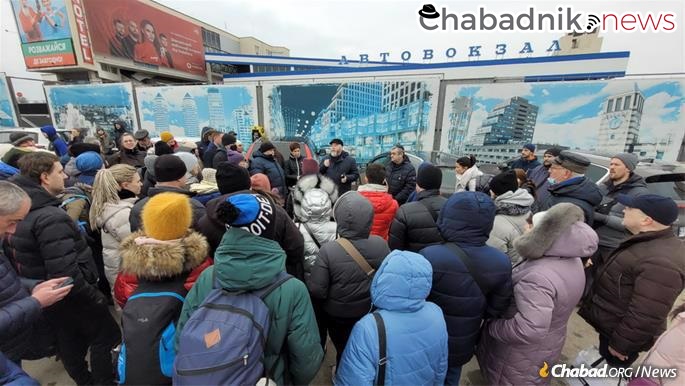
Heading West
Together with hundreds of other Ukrainian refugees, Alona and her family boarded the train in Dnipro and took their places. Every adult had a place, while she shared her own with Danya. The train was Lviv-bound, and when those around her heard the family came from bombed-out Kharkov as opposed to less-affected towns, they offered up cookies, treats and whatever else they could to make their journey more comfortable.
Alona and her family did not disembark at Lviv, whose station and border crossing has been mobbed in the last few weeks, but instead went on to the quieter border crossing outside of Uzhgorod. Men between the ages of 18 to 60 are not allowed to leave Ukraine, so Alona’s husband, who has applied for a military exemption due to a serious workplace accident he suffered, could not accompany the family further.
Alona, Danya, her parents and great-aunt crossed into Slovakia. On the other side of the border they were greeted by the Jewish community as well, here with buses sent by the Jewish Community of Hamburg, Germany, which is led by its chairman Philipp Stricharz and Rabbi Shlomo Bistritsky, who also directs Chabad of Hamburg. Assistance for the project in Hamburg came broadly: when the Second Mayor of Hamburg, Katharina Fegebank, heard the Jewish community was bringing Ukrainian refugees to Hamburg, she arranged for the city to send buses for the cause. The Dedovskys boarded at around midnight and arrived in Hamburg in the closing minutes of March 9—24 hours later after crossing the border, five full days after setting out from Kharkov.
Now the Dedovsky family is in a comfortable hotel in Hamburg, also arranged by the city’s Jewish community. They’re not sure what comes next, but at least they have time to breathe and figure that out. There are relatively minor inconveniences as well: There’s the language barrier and the fact that it’s proven extremely difficult to change Ukrainian hryvnia for euros. Alona says that Danya’s been happy ever since that traumatic walk to the bus in Kharkov, seeing the travel from place to place, country to country, as one big adventure. He misses his father and misses home, but the main crisis is behind them.
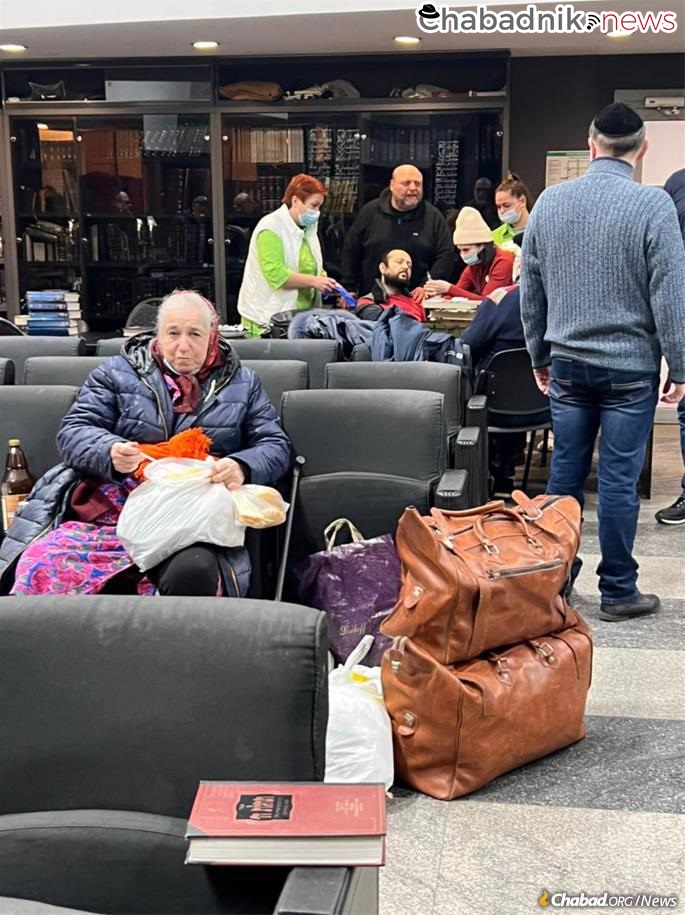
“Thank G‑d, he almost didn’t hear the bombs,” she says. “I understood right away if Danya would have seen something he might not be the same ever again. I have a friend whose child has stopped speaking completely. It’s terrible. It’s hard to believe this is real.”
Alona says her son played a central role in the family’s escape from Kharkov. The Dedovskys first connected with the Kharkov Jewish community when they decided they wanted Danya to receive a Jewish education and sent him to Chabad’s preschool. That decision proved crucial on many levels. Though, of course, the Jewish community has been assisting everyone in need of help, the Dedovskys would likely not have known of a way out if not for that connection.
“If not for the Jewish community we’d have never left,” she says. “My father is over 70. He didn’t want to go, but when he heard the community was arranging it and all we had to do was show up, he agreed, so we went. Without Esther, without the community, we’d still be sitting in the metro.”
Having left her home and hopes behind in a devastated Kharkov, Alona echoes G‑d’s injunction in the Torah to “choose life” when she says: “We had to run because we want to live. I want my son to have a life.”
The Ukraine Jewish Relief Fund has been established to help provide assistance to the Jewish communities in Ukraine impacted by the war.
Click here for a prayer you can say and a list of good deeds you can do in the merit of the protection of all those in harm’s way.
